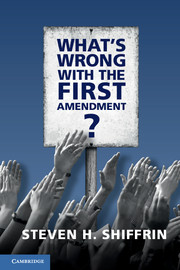1 - Privacy
from PART I
Published online by Cambridge University Press: 05 September 2016
Summary
Privacy is a much treasured right in the American Constitution even though the word does not appear in the written document. In addition, privacy is protected in various statutory and common law contexts wholly apart from the constitutional reach of privacy protection. At its most general level, privacy refers the right to be left alone. It seems to protect a sphere of private autonomy. Thus, we refer to the “private” market, which many conservatives feel should not be regulated.
More centrally, however, privacy refers to a zone of intimacy in which human beings can live flourishing lives without the intrusion and scrutiny of others. That zone can include the right to determine whether or not to bear a child, including the right to use contraceptives or to have an abortion, the right to engage in sexual relations including same-sex relations, and the right to be free from unreasonable searches. Privacy protects communications between spouses, lawyer and client, doctor (or psychotherapist) and patient, priest and penitent. In some states, it provides that data about a human being cannot be collected or disseminated. It might promote government efficiency in combating crime and it would surely advance the cause of the social sciences, but we would not tolerate cameras and recording devices in our homes, let alone our bedrooms. Human beings require a private life in which they are not on a public stage. Friendships and intimate relations are rooted in the disclosure of our “private” selves. Our public face ordinarily wears a mask of formality, which to various degrees we shed in private. We may never be a wholly open book, but we are more open to some than others. In addition, privacy enables us to develop our own independent personality, our sense of creativity, and our critical sensibilities and substance. Without privacy, the evidence suggests that we tend to conform, to do what is expected of us, and to succumb to social construction, inhibiting play, innovation, and independence. In this respect, to protect privacy is to encourage values supported by the First Amendment.
If government, another institution, or a person invades our privacy, we believe that our human dignity has been compromised. Freedom of speech itself is partly based on a commitment to the dignity of human beings and their right to make autonomous decisions as to how their lives should be lived.
- Type
- Chapter
- Information
- What's Wrong with the First Amendment , pp. 13 - 24Publisher: Cambridge University PressPrint publication year: 2016
- 1
- Cited by

